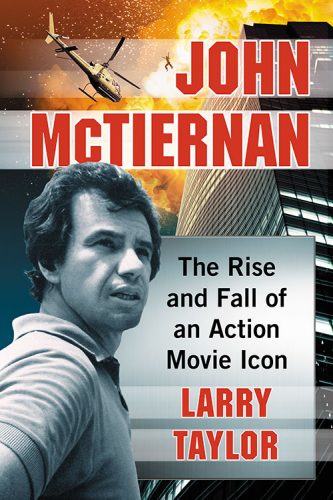 By LARRY TAYLOR (McFarland & Company, Inc.; 2018)
By LARRY TAYLOR (McFarland & Company, Inc.; 2018)
Few directors have had a more dramatic career trajectory than John McTiernan, who attained the pinnacle of success in Hollywood, only to see his fortunes decline quite precipitously, and eventually bottom out entirely. JOHN MCTIERNAN THE RISE AND FALL OF AN ACTION MOVIE ICON is the first English language book about McTiernan, and while it isn’t in any way great or profound—with author Larry Taylor forsaking direct interviews in favor of info taken from readily available print and online resources—it is quite fine, providing an eminently readable recounting of its subject’s life and career.
It all began in the 1970s, when McTiernan attended the American Film Institute (the alma mater of future notables like David Lynch, Darren Aronofsky and Terrence Malick) and fell under the spell of European cinema. That sensibility was carried over, Taylor claims, into PREDATOR and DIE HARD, the two major action movies McTiernan directed in the 1980s, both of which were massive successes that changed the face of blockbuster moviemaking forever (of McTiernan’s other, much less successful 1980s film, “The less said about NOMADS, the better”). McTiernan’s skill was such that he was able to get audiences to sit still for 1990’s THE HUNT FOR RED OCTOBER, a thriller that relied on intrigue and intelligence rather than action.
Things went downhill in the following decades, when McTiernan presided over three of the most notorious debacles in modern film history: LAST ACTION HERO, THE 13th WARRIOR and the 2002 ROLLERBALL remake. All three movies were destroyed by studio executive meddling, and it was during the production of ROLLERBALL that McTiernan let his long-simmering resentment of the Hollywood system boil over, leading to an act that directly precipitated his downfall: he contacted the notorious “Hollywood fixer” Anthony Pellicano about wiretapping a producer’s phone.
McTiernan wound up imprisoned for ten months in 2013-14, which Taylor convincingly argues was an unjust punishment that came about solely to justify the time and money expended in the taking down of Pellicano (who for the record served 30 months in prison). We also get the lowdown on McTiernan’s post-prison life, marked by mounting legal costs and homelessness as he desperately tried to find work directing straight-to-DVD no-budgeters (thus far without success)—a far cry, obviously, from PREDATOR and DIE HARD.
It’s to Larry Taylor credit that he’s able to relate this convoluted and often downright bizarre saga with as much clarity as he does, resulting in a fast read that won’t tax anyone’s brain overmuch. I don’t agree with all of Taylor’s conclusions (he tends to vastly overrate the films of his subject, THE THOMAS CROWN AFFAIR remake in particular, which Taylor seems to like primarily because it contains an age-appropriate female lead), but he makes them, at least, with admirable forcefulness.
